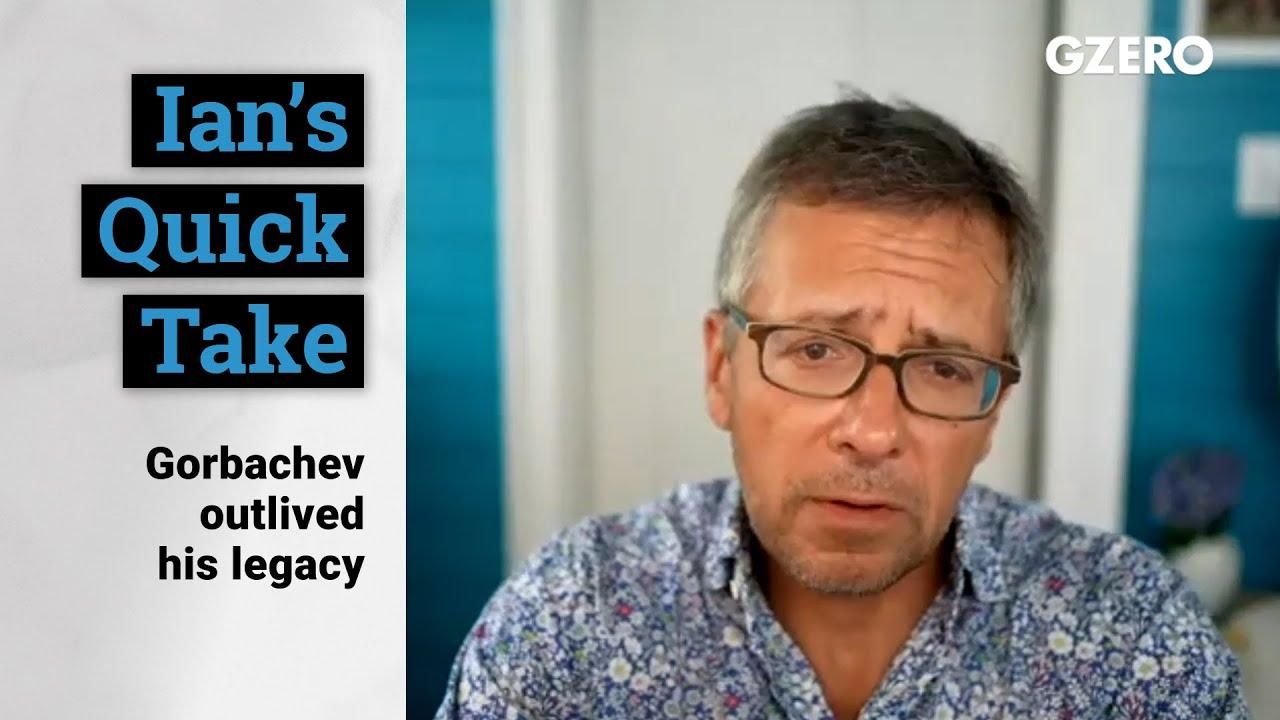Quick Take
Mikhail Gorbachev outlived his legacy

Mikhail Gorbachev Outlived His Legacy | Quick Take | GZERO Media

Ian Bremmer's Quick Take:
Mikhail Gorbachev, the final general secretary of the Communist Party of the Soviet Union has died at 91. He's an extraordinary and truly world changing leader, ultimately, and tragically a failed one as well. Arguably, Gorbachev was the leader that made the greatest impact on my professional life. My first trip outside the United States was to the former Soviet Union back in 1986. Gorbachev had just gotten into power the year before, and actually it wasn't at all clear when I went there that he was going to be this great reformer. In his early days, he was focused on anti-alcohol campaign, anti-corruption campaign, sort of trying to improve Soviet society, but also working to concentrate, more power in the hands of the politburo, where there was a serious power struggle going on. In fact, the early days you could argue that Gorbachev and Xi Jinping actually had a lot in common, but that's really where the comparisons end.
The Chernobyl disaster hit just a couple months before I showed up in the Soviet Union. And therefore at the beginning of Gorbachev's rule. I remember meeting a bunch of Cuban students that were traveling to Leningrad, had just been in Ukraine, and had literally no idea what had happened until they got into the Russian Republic. And they were pretty scared by what exposure they might, might not have had. But of course, this was an enormous tragedy inside the former Soviet Union, and also one that the leaders got bad information on, and kind of proved to Gorbachev that the political system was increasingly sclerotic and bankrupt, and the economic trajectory of the country was failing, and he really wanted to change it. And he attempted to do that through three unprecedented structural reforms, in what had been an authoritarian state, capitalist society.
First glasnost, political openness. In other words, free speech. Secondly, perestroika, economic opening. Capitalism, and third khozraschyot, self accounting, federalism. In other words, let people say what they want about the government. Let them make money as they can. And let local officials have more accountability for the decision making processes that are underneath them.
So opposite from what we see in Russia today, and under Putin today in pretty much every way. And Gorbachev also very much an anti-imperialist, recognized that Soviets were overspending massively on the military, and wanted to stop that too. And so he ended the disastrous Soviet war in Afghanistan. Americans did not of course learn great lessons from that. But in short order, the internal response in Soviet empire from all of this reform, was a large number of rested populations that wanted out, because Soviet empire was of course massively repressive. And when the tools of repression were no longer there, the attraction of the freedoms, the economic, the human liberties that existed in the West, were suddenly greatly appealing to those that had been behind the iron curtain. And so in short order, with these reforms, you saw a massive political uprising to end Soviet power, first in Eastern bloc countries and Gorbachev chose not to intervene militarily to try to prevent them from leaving. And that of course, led to the Wall coming down, and the independence of all of these Eastern European countries that are now, of course, in NATO, that are now in the European Union.
And then, when 15 Soviet republics themselves started demanding independence, first in the Baltic states, Ukraine, and then eventually in Central Asia, and again, across all of the former Soviet republics, finally leading to a failed military coup against Gorbachev in August of 1991. Mikhail Gorbachev accepted the end of Soviet empire peacefully on Christmas Day, four months later.
Perhaps the truest tragedy of a statesman is when you outlive your legacy, and perhaps nothing could be more true of Gorbachev. President, and now indeed dictator, of Russia, Vladimir Putin has said that he views Soviet collapse as the greatest geopolitical tragedy of the 20th century. And he has devoted his time in office, first and foremost, to reviving a Russian empire. And Russia today in 2022 is precisely the opposite of everything Gorbachev had hoped it would be. We're all the worst for that. And most of all, the Russians themselves.
Mikhail Gorbachev, rest in peace.
In this Quick Take, Ian Bremmer addresses the killing of Alex Pretti at a protest in Minneapolis, calling it “a tipping point” in America’s increasingly volatile politics.
Who decides the boundaries for artificial intelligence, and how do governments ensure public trust? Speaking at the 2026 World Economic Forum in Davos, Arancha González Laya, Dean of the Paris School of International Affairs and former Foreign Minister of Spain, emphasized the importance of clear regulations to maintain trust in technology.
Will AI change the balance of power in the world? At the 2026 World Economic Forum in Davos, Ian Bremmer addresses how artificial intelligence could redefine global politics, human behavior, and societal stability.
Ian Bremmer sits down with Finland’s President Alexander Stubb and the IMF’s Kristalina Georgieva on the sidelines of the World Economic Forum to discuss President Trump’s Greenland threats, the state of the global economy, and the future of the transatlantic relationship.